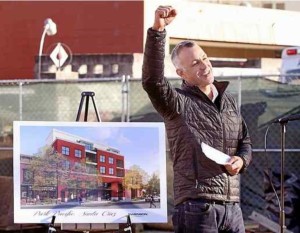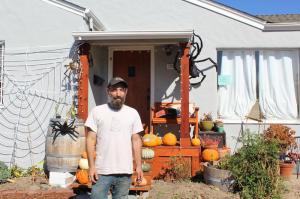Month: December 2017
New Scotts Valley mayor eyes affordable housing as key priority
By Jondi Gumz, Santa Cruz Sentinel
http://www.santacruzsentinel.com/government-and-politics/20171221/new-scotts-valley-mayor-eyes-affordable-housing-as-key-priority
December 21, 2017, SCOTTS VALLEY >> New Scotts Valley Mayor Jim Reed said he plans to work on affordable housing. Reed, chief of staff for San Jose Mayor Sam Liccardo, was elected on a 5-0 vote Wednesday night for his new role. A three-term Scotts Valley City Council member and mayor in 2009-2010 and 2013-2014, he said he wants to look at best practices of other cities.

A common scenario is for 15 percent of homes in a development to be sold at a lower price, making them affordable to buyers with less income, but those buyers have to give up appreciation to retain affordability. Reed said he’s interested in “affordability by design,” where homes are smaller and thus have lower asking prices.
As for the long discussed Town Center project, he said the economic development subcommittee has changed the criteria due to the “Amazon effect.” With more people ordering goods online, the demand for more retail is slacking. So the Town Center project will be primarily a housing project, with an affordable component, he said.
He’d like to have senior housing and “lifestyle” commercial — restaurants and bars — to complement “The Hangar” brew pub at Skypark, which developer Corbett Wright and partner Rob Stuart are building on Mount Hermon Road. “It’s the market,” said Councilman Randy Johnson, who served as mayor in 2017, explaining why there’s no rush to build retail stores. “Developers are risk-averse.”
Jack Dilles, elected in 2016, was chosen vice mayor on a 4-1 vote, with Councilwoman Donna Lind nominating Councilwoman Stephany Aguilar. Dilles said he is concerned about five-year financial projections presented by City Manager Jenny Haruyama and the upcoming expiration of the eight-year sales tax voters approved in 2013. A special meeting is planned early in the new year to set city priorities.
City Clerk Tracy Ferrara said a new user-friendly website is coming in April.
Public Works Director Scott Hamby, who worked for the city 32 years, is retiring Dec. 29. He will be replaced on an interim basis by Steve Hammack, a Scotts Valley resident who retired after a career as a parks manager, working for state parks, the city of Santa Cruz and San Jose.
Swenson starts building downtown Santa Cruz housing at key Pacific Avenue location
By Jondi Gumz, Santa Cruz Sentinel
http://www.santacruzsentinel.com/article/NE/20171220/NEWS/171229959
December 20, 2017, SANTA CRUZ >> Builder Swenson celebrated Wednesday afternoon, toasting the start of the $35 million Park Pacific development that in two years will offer 79 rental units, a ground-floor restaurant and fill a key downtown property vacant since the 1989 earthquake.
“Cheers,” said Case Swenson, president of San Jose-based Swenson and son of founder Barry Swenson, raising a glass of

red wine. “It’s been a good year,” said Jesse Nickell III, Swenson senior vice president, raising a glass of white wine. The housing is “very welcomed in our city,” Mayor David Terrazas told 60 people at Wednesday’s groundbreaking. “Barry Swenson is really committed to investing in our town.” Crews last month began moving earth at the building site, which is in downtown Santa Cruz next to Lulu Carpenter’s and Bank of the West, and the project is expected to create up to 300 construction jobs.
Case Swenson briefly mentioned the challenges of the project at 1547 Pacific Ave., once owned by Ron Lau, whose building was demolished after the Loma Prieta earthquake. While the rest of Pacific Garden Mall was rebuilt after the quake, financing woes hampered rebuilding efforts at this location.
Lau was unable to reach agreement on a project, and city officials considered the site an eyesore. In 2005, the city Redevelopment Agency filed suit against Lau to take the property under eminent domain so Bolton Hill could build condos there. Lau got a settlement of $1.7 million and rights to two condos but the seven-story development the council approved in 2006 was not built before the economy crashed, and Santa Cruz County Bank, which had financed the project, foreclosed. The Rodoni family and Clarum Homes were involved before Swenson stepped in. “It’s so hard to get these buildings off the ground,” said Swenson. “It’s a flat-out miracle.” Barry Swenson bought the property in 2015 for $6.25 million, reviving a project that had faced one snag after another.
Case Swenson got emotional as he thanked his father, who had a stroke last year and was unable to attend. “My dad worked on this 15 years ago,” he said. “I wish he could be here.” Case Swenson also thanked Wells Fargo, which is providing financing for Park Pacific, and others who helped the project along the way. Case said the Park Pacific represents the company’s 12th groundbreaking of the year, a sign of how the construction industry is booming over the hill, where much of the development is taking place.
Nickell, who’s been with Swenson for 31 years, said the company has invested $144 million in downtown Santa Cruz, starting with building the St. George Hotel in 1991. Among them, he said, are: Bookshop Santa Cruz, Chocolat, Pacific Wave, Saturn Cafe, Lali’s, Walgreens, Eco Goods, University Town Center, Five Guys, Shogun Sushi, Del Mar Theatre restoration, Sockshop & Shoe Co., Cruzio, Ecology Action, Walnut Commons Cohousing, the NIAC Building and Coast Commercial Bank’s headquarters at 75 River St.
About 60 people attended, including Santa Cruz City Councilwoman Richelle Noroyan, former Santa Cruz Mayor Don Lane and many of the Swenson employees working on Five55 Pacific Ave., a 94-unit rental complex due for completion in January, and Aptos Village, 69 residential units with retail and office space, parts of which are to be ready by the end of 2018.
The City Council in September approved Swenson’s request to build 79 units at 1547 Pacific Ave. instead of 63, which helped the company obtain financing. The project will have fewer larger units and more smaller ones: 16 studios, 43 one-bedroom units and 20 two-bedroom units. Studios will have 450 square feet, one-bedroom units 700 square feet and two-bedroom units 1,000 square feet. Parking will be underground.
Construction is expected to take up to 24 months. The complex is to be rented at first, then sold as individual condominiums, with 12 dedicated as affordable.
In September, Swenson project manager Scott Connelly estimated studios could rent for $2,000 a month, one bedrooms for $2,500 to $3,000 a month, and two bedrooms at $3,700 a month, with some higher-end units.


